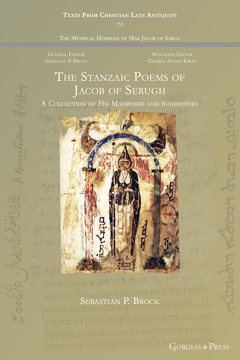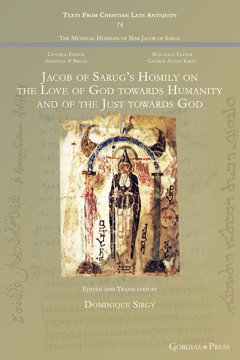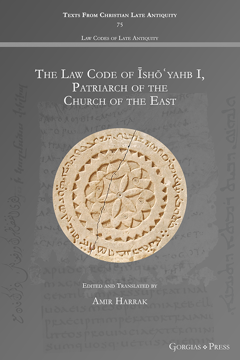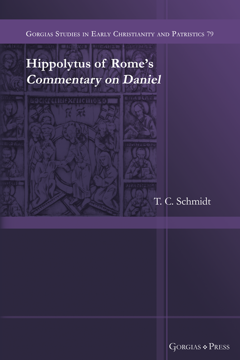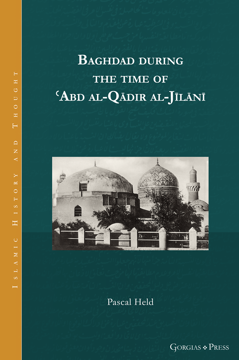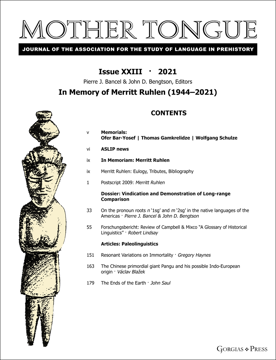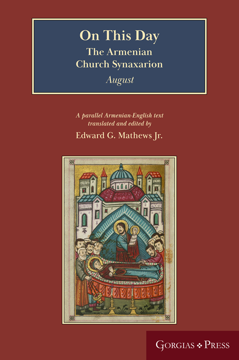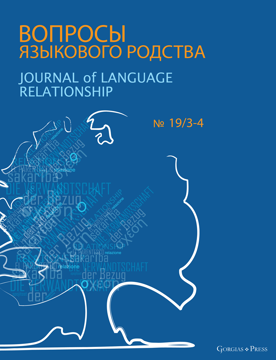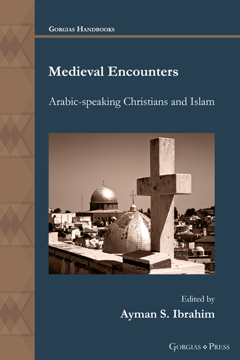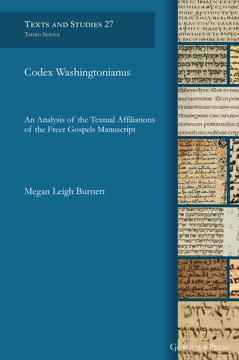The Stanzaic Poems of Jacob of Serugh
A Collection of His Madroshe and Sughyotho
Series: Texts from Christian Late Antiquity 72
ISBN: 978-1-4632-4430-9
Although the verse homilies of Jacob of Serugh are well known to lovers of Syriac literature, his stanzaic poetry, in the form of madroshe and sughyotho, have been largely forgotten. This volume contains twenty-five poems preserved in their complete form and attributed to Jacob in old manuscripts of the sixth/seventh to ninth/tenth century preserved today in the British Library, but largely originating from Deir al-Surian in Egypt.
$59.00 (USD) $35.40 (USD)
Jacob of Sarug's Homily on the Love of God towards Humanity and of the Just towards God
Edited and Translated by Dominique Sirgy
Series: Texts from Christian Late Antiquity 74
ISBN: 978-1-4632-4432-3
Jacob of Sarug's homily chronicles the unravelling of God's love in sacred history and the inability of humankind to return God's love and grace.
$28.00 (USD) $16.80 (USD)
The Law Code of Īshōʿyahb I, Patriarch of the Church of the East
Edited and Translated by Amir Harrak
Series: Texts from Christian Late Antiquity 75
ISBN: 978-1-4632-4434-7
During the 6th century AD, Īshōʿyahb I, Patriarch of the Church of the East, produced a code of law dealing with questions raised by Bishop Jacob of Darai in the Gulf. Perennial Church issues include priestly conducts, ecclesiastical rankings, and ordinations. Legal matters for the faithful concern wills, marriages, vows, lending at interest, and swearing. Most interesting are names of church architecture that the Code gives, including bema, diaconicon, and qestroma, terms that are still used today.
$39.00 (USD) $23.40 (USD)
Hippolytus of Rome's Commentary on Daniel
ISBN: 978-1-4632-4436-1
In his Commentary on Daniel, the earliest extant Christian commentary, Hippolytus interprets the deeds and visions of Daniel against the backdrop of contemporary Roman persecution and eschatological expectation, thus providing much information about Christian affairs in the early third century. Throughout the commentary Hippolytus further discusses his distinctive Logos theology and also makes mention of various liturgical practices evolving baptism, anointing, the celebration of Easter and perhaps the date of Christmas.
$37.00 (USD) $22.20 (USD)
Baghdad during the time of ʿAbd al-Qādir al-Jīlānī
By Pascal Held
Series: Islamic History and Thought 29
ISBN: 978-1-4632-4438-5
A study of the life and background of ʿAbd al-Qādir al-Jīlānī, putative founder of the Qādiriyya order, investigating the sources for his life and attributed works. The book seeks to elucidate the ideas of al-Jīlānī, and to formulate a picture of the most prominent trends of pious and mystical thought in Baghdad during the twelfth century, providing a cultural and geographical angle to the study of Islamic mysticism and piety.
$115.00 (USD) $69.00 (USD)
Mother Tongue (XXIII)
(XXIII) 2021
Edited by Pierre J. Bancel & John D. Bengtson
Series: Mother Tongue 23
ISBN: 978-1-4632-4441-5
Journal of the Association for the Study of Language in Prehistory.
$55.00 (USD)
On This Day (August)
The Armenian Church Synaxarion (Yaysmawurkʿ)
Edited and Translated by Edward G Mathews Jr
Series: The Armenian Church Synaxarion 8
ISBN: 978-1-4632-4443-9
The Armenian Church Synaxarion is a collection of saints’ lives according to the day of the year on which each saint is celebrated. Part of the great and varied Armenian liturgical tradition from the turn of the first millennium, the first Armenian Church Synaxarion represented the logical culmination of a long and steady development of what is today called the cult of the saints. This volume, the first Armenian-English edition, is the eighth of a twelve-volume series—one for each month of the year—and is ideal for personal devotional use or as a valuable resource for anyone interested in saints.
$79.00 (USD) $47.40 (USD)
Journal of Language Relationship 19/3-4
Editor-in-Chief Vladimir Dybo; Managing Editor George Starostin; Editorial Secretary Tatiana Mikhailova; Editorial Board Anna Dybo, Manuel Molina, M. N. Saenko & Ilya Yakubovich
Series: Journal of Language Relationship 19/3-4
ISBN: 978-1-4632-4445-3
The Journal of Language Relationship is an international periodical publication devoted to the issues of comparative linguistics and the history of the human language. The Journal contains articles written in English and Russian, as well as scientific reviews, discussions and reports from international linguistic conferences and seminars.
$74.00 (USD) $44.40 (USD)
Medieval Encounters
Arabic-speaking Christians and Islam
Edited by Ayman S. Ibrahim; Contribution by Mark Beaumont, David Bertaina, Clint Hackenburg, Sandra Toenies Keating, Michael F. Kuhn, John C. Lamoreaux, Mourad Takawi, Jack Tannous, Alexander Treiger & Mina Yousef
Series: Gorgias Handbooks 55
ISBN: 978-1-4632-4447-7
A sourcebook of major Arabic Christian theologians and texts from the 9th-11th centuries. Christian authors who spoke and wrote Arabic had no choice but to engage with Islam and the complex realities of life—initially as a majority, later as a minority—under Muslim rule. They had to express their theology in new ways, polemicize against the claims of a new religion, as well as defend their doctrines against Islam’s challenges.
$55.00 (USD)
Codex Washingtonianus
An Analysis of the Textual Affiliations of the Freer Gospels Manuscript
Series: Texts and Studies (Third Series) 27
ISBN: 978-1-4632-4451-4
This book investigates the biblical text of Codex Washingtonianus, also called the Freer Gospels, Codex W and GA 032. There are numerous distinctive features in this early and important gospel book, including the differing affiliation of its text in separate sections (known as block mixture). The study examines and evaluates the blocks of text in this manuscript through the extensive application of the technique of quantitative analysis, which sheds light on the textual relationship between Codex Washingtonianus and other gospel manuscripts. Paratextual features, orthographic variations, and singular readings are also described and analysed. This book thus functions as an investigation of the phenomenon of block mixture in itself as well as the character of this particular manuscript, confirming many of the findings of previous scholarship and providing new data from the context of modern research.
$114.95 (USD) $68.97 (USD)
